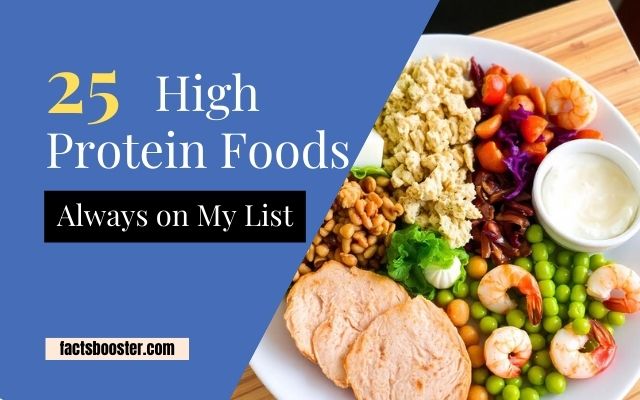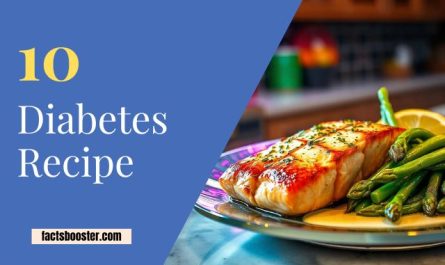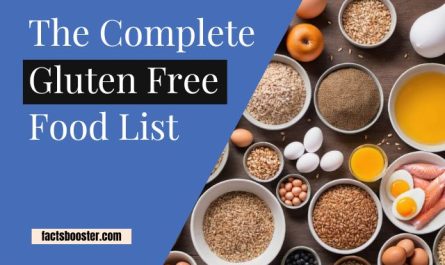If you’re looking to build muscle, lose weight, or simply feel more energized throughout the day, adding high-protein foods to your diet is essential. Protein helps repair muscle tissue, boosts metabolism, and keeps you fuller for longer. In this article, I’ll walk you through why protein is so important and share my list of 25 high-protein foods, complete with their nutritional benefits.
Why High-Protein Foods Are Crucial for Your Diet
Protein is the building block of muscles, skin, and bones. It helps with cell repair, supports immune function, and creates enzymes and hormones. Whether your goal is to build muscle, improve your athletic performance, or manage your weight, a high-protein diet can support your objectives. Additionally, protein keeps you fuller for longer, which helps curb unnecessary snacking and supports weight loss goals.
A high-protein diet can:
- Aid in muscle recovery after workouts.
- Boost metabolism and help burn more calories.
- Stabilize blood sugar and promote steady energy levels.

25 High-Protein Foods Which Are Always on My List
Here’s my go-to list of protein-rich foods, including their protein content and additional nutritional benefits. These foods are not only high in protein but also packed with other essential nutrients.
| Food | Protein per 100g | Other Key Nutrients |
| Chicken Breast | 31g | B vitamins, selenium |
| Eggs | 13g | Vitamin D, choline |
| Greek Yogurt | 10g | Calcium, probiotics |
| Tuna | 30g | Omega-3 fatty acids |
| Cottage Cheese | 11g | Calcium, B12 |
| Tempeh | 19g | Iron, calcium |
| Lentils | 9g | Fiber, folate |
| Quinoa | 4g | Fiber, magnesium |
| Edamame | 11g | Fiber, vitamin C |
| Turkey Breast | 29g | Selenium, B vitamins |
| Lean Beef | 26g | Iron, zinc |
| Tofu | 8g | Iron, calcium |
| Salmon | 20g | Omega-3s, vitamin B12 |
| Black Beans | 9g | Fiber, folate |
| Almonds | 21g | Healthy fats, vitamin E |
| Peanut Butter | 25g | Healthy fats, potassium |
| Chickpeas | 8g | Fiber, iron |
| Shrimp | 24g | Selenium, vitamin B12 |
| Pumpkin Seeds | 19g | Magnesium, zinc |
| Pork Loin | 25g | B vitamins, selenium |
| Whey Protein | 80g (per 100g) | BCAAs, calcium |
| Chia Seeds | 17g | Omega-3s, fiber |
| Hemp Seeds | 32g | Healthy fats, iron |
| Seitan | 75g | Low fat, iron |
| Venison | 24g | Iron, zinc |
As you can see, these foods are rich in more than just protein. Many are also packed with healthy fats, fiber, vitamins, and minerals, which can contribute to your overall well-being. For example, salmon and tuna provide omega-3 fatty acids for heart health, while lentils and quinoa are excellent plant-based protein sources with the added benefit of fiber.
How Much Protein Do You Need?
Protein requirements can vary depending on factors such as age, activity level, and specific health goals. As a general guideline, the Recommended Dietary Allowance (RDA) for protein is 0.8 grams per kilogram of body weight. However, for those looking to build muscle or engage in high-intensity exercise, protein needs may increase to 1.2–2.0 grams per kilogram of body weight. (1)
- Sedentary adults: 0.8g per kg of body weight.
- Active adults: 1.2–1.7g per kg of body weight.
- Athletes or bodybuilders: Up to 2.0g per kg of body weight.
For example, if you weigh 70kg (154 lbs), you should aim for at least 56g of protein per day, but if you’re engaging in muscle-building activities, you may need closer to 84–140g of protein daily.
Tips for Including More Protein in Your Diet
Incorporating more protein into your diet doesn’t have to be complicated. Here are some simple tips to boost your protein intake:
- Start Your Day with Protein: Choose protein-rich breakfasts like eggs, Greek yogurt, or a protein smoothie.
- Snack on Protein: Swap carb-heavy snacks for high-protein options like almonds, beef jerky, or edamame.
- Include Protein in Every Meal: Make sure each meal has a source of protein, whether it’s meat, fish, legumes, or tofu.
- Meal Prep: Prep protein-rich meals like grilled chicken or quinoa bowls in advance for quick, healthy lunches and dinners.
- Add Protein to Sides: Enhance your salads or soups with beans, chickpeas, or a sprinkle of nuts.
- Use Protein Supplements: If you’re struggling to meet your protein needs, consider adding a protein powder to smoothies or shakes.
Common Myths About High Protein Diets
There are a lot of misconceptions when it comes to high-protein diets. Let’s debunk some common myths:
- Myth: Too Much Protein Is Bad for Your Kidneys
Truth: Unless you have pre-existing kidney conditions, a high-protein diet is not harmful to your kidneys. Protein supports kidney function in healthy individuals.
- Myth: Protein Makes You Fat
Truth: While any macronutrient can lead to weight gain if consumed in excess, protein promotes weight loss by keeping you full and boosting your metabolism.
- Myth: You Need Animal Protein for Muscle Growth
Truth: While animal protein is a complete protein source, plant-based proteins (like quinoa, tempeh, and beans) can also support muscle growth when combined properly.
- Myth: High-Protein Diets Lack Fiber
Truth: You can still get plenty of fiber by incorporating protein-rich, fiber-filled foods like lentils, chickpeas, and quinoa.
- Myth: Protein Supplements Are Necessary
Truth: You don’t need supplements if you’re meeting your protein needs through whole foods. Supplements are convenient but not essential.
Conclusion
A high-protein diet can provide numerous health benefits, from building muscle to stabilizing blood sugar and promoting weight loss. By incorporating these 25 high-protein foods into your diet, you’ll enjoy a variety of nutrients beyond protein, all while supporting your health and fitness goals.
Whether you’re snacking on almonds or enjoying a hearty meal of salmon and quinoa, these foods will keep you feeling full, energized, and ready to tackle whatever comes your way. By making small adjustments to your meals and snacks, you can easily hit your protein intake goals and reap the benefits of a balanced, high-protein diet.


